#Karin boye young royals
Explore tagged Tumblr posts
Text
For the Karin Boye stans among us this was Wille’s wall quote:
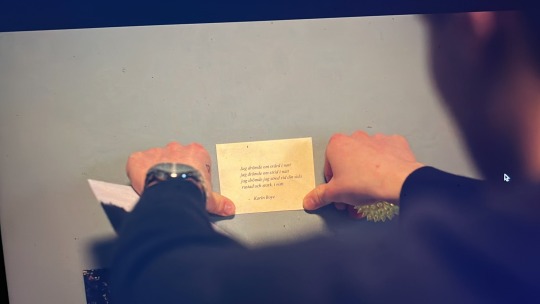
This is the first stanza of Karin Boye’s poem “Sköldmön” (Shield-Maiden) first published in 1924.
(Swedish)
Jag drömde om svärd i natt.
Jag drömde om strid i natt.
Jag drömde jag stred vid din sida
rustad och stark, i natt
(English)
I dreamt of swords last night.
I dreamt of battle last night.
I dreamt I fought by your side
armored and strong, last night.
628 notes
·
View notes
Text
Wille's Crisis : an essay about Kris (1934) and Young Royals (2021)
While watching Young Royals’ third season, I couldn’t get Karin Boye’s novel Kris out of my head. As a fan of Young Royals that feels very chill and very normal about it, I have hence written a five page brain-dump on how Malin Forst and Wilhelm’s characters and worlds are intertwined. (Small disclamers : I’m quoting Amanda Doxtater’s 2020 english translation of the novel and I’m french-canadian, so english is my second language.)
Who is Karin Boye ?
Karin Boye (1900-1940) was a leading figure in Swedish modernist literature and poetry. In 1920, at the age of 20, she studied one year in Stockholm to become a primary school teacher and after graduation, continued teaching, writing, militant engagement and several years of study in related fields. Among all of her works, the most explicitly autobiographical is her autofictive novel Kris (1934). This powerful novel explores the homosexuality and crisis of religious faith of a young woman named Malin Forst.
Malin Forst & Wilhelm
During her studies in teaching, Karin’s 20-years-old alter-ego Malin goes through an existential crisis. She feels completely paralyzed by her guilt due to her selfish inaction in the face of universal suffering, her lack of trust in institutions (educational, medical, etc.) and, worst of all, her doubts about her relationship with God. Kris also deals with Malin’s relationship to her own sexuality with the meeting of a classmate, Siv, to whom she will become passionately obsessed without ever talking to her.
We meet 16-years-old Wilhelm as a first year student at Hillerska. His failures as a royal figure and his complicated relationships to his loved ones make him feel powerless and guilty. He is thrown off balance by his doubts of the monarchic system, but most importantly, by his doubts of his life’s role model, Erik. Young Royals also deals with Wilhelm’s relationship to his own sexuality with the meeting of a classmate, Simon… Are we seeing the parallels here ?
While Malin’s torments lead her to shut down, Wilhelm screams. But both feel paralysed and don’t know how to exist out of the system they grew up in. And it’s the meeting of a same-sex student that leads them to a freer path.
« I want to see Siv. I want to be where Siv is. »
Previously, Malin considered the fusion of the will of the human with the will of God to be the most important of aspirations. Without this reference point, she has no will nor desire… until she meets another student, Siv. Her simple presence rekindles for the first time in the novel a desire, burning and forbidden: “I want to see Siv. I want to be where Siv is.” … And here is how this whole essay has come to exist. While watching season three, I joked endearingly with my friends about the way that Wille’s only hobby is to be with Simon, but I felt sad for him. Until I understood he’s on the first part of his self-discovery journey. His first true desire that stems from inside of him and wasn’t imposed by the system is “I want to see Simon. I want to be where Simon is.”
Interestingly enough, Siv and Simon both become a new manifestation of something that Malin and Wilhelm have lost. We, the reader, meet Malin when she is ‘grieving’ her old relationship to God and deconstructing her understanding of God as a single entity. Amazed by Siv’s ‘perfection’, Malin raises her to a kind of divine position with great powers. Wilhelm, for his part, feels at home with Simon because of the way he makes Wilhelm’s entire being comes alive, weightless and playful… A feeling of joy, innocence and safety he’s only ever felt with Erik before.
Anxious and desperate, Malin and Wilhelm are latching to their comfort person, making them their whole word in a way that has to change for them to grow up. After realizing Siv’s feeling for a fellow male classmate, Malin is shaken : “Only now could she see that she had embarken upon the false path of mistaking a person for what is highest and most beautiful.” Not only does this quote mirror Wilhelm letting go of his idealised conception of Erik, it is also mirrorring his realisation that Simon is not a perfectly stable and unbreakable anchor on which he can blindly rely on : “I have to take responsibilities for my own problem. I can’t drag him down with me.”
Don’t give it a name
An important part of Malin’s journey is relinquishing the power she gives to words, especially regarding God and her sexuality. Throughout the novel, she refuses to name the emotion she feels for Siv. On the day of her meeting with Siv, Malin thinks: “You, lips, I implore you to clamp so hard upon the unsayable, that not a word slips out to assert its malicious pettiness and obfuscation ! Be still, thoughts, don’t interrupt, for you have no idea what this is ! (...) Don’t give it a name, let it be just as it is, here in my blood and my eyes, life and sap ! The wonder of new creation need not be named.”
Wilhelm’s complicated relationship to words is shown in the way that he shouts his love for Simon from every rooftop, but does not wish to label his sexual orientation. In season three, he says the word queer for the first time and his voice is seeped with discomfort. He is not claiming this word as part of his identity and rather feels constricted by it, probably in the same way that every other label put on him has made him suffocate.
Furthermore, both Malin and Wilhelm wish to express themselves and experience the world, not through the restrictive lens of language, but through the sensory world. In Kris, after seeing Siv for the first time, Malin’s five senses awaken. A dialogue takes place between the sense of sight and hearing, reminding me of the way that Wilhelm and Simon’s intimacy is developped through the gentle touch of noses, the sounds of breathing, the glow of golden light and fingers lingering slightly above the other’s body… ‘Sight’ says “I’m confused. I no longer know whether I am sight or not. I envelop things and follow them as if I were touch, I hold my breath in quiet anticipation as if I were hearing, I breathe in, like one intoxicated, as if I were smell, and I drink in long, deep, draughts as if I were taste. (...) Could I be standing at threshold of some new creation ?” To which ‘hearing’ responds “ (...) Admit it - isn’t revelation through the senses at the same time the revelation of what lies beyond the senses, of what creates the senses, of the limitless feelings of eternal love ? (...)”
Checkmate
Kris’s narration drastically changes points of view in unexpected moments, moving from the pov of human characters to the pov of abstract entities. The two most important are BLACK and WHITE, two sources of cosmic powers playing a chess game whose game board is humanity.
On the one hand, WHITE represents the norm, also illustrated by threats from nature such as stormy and dangerous waters, cold, humidity and darkness, but also under the traits of the dominant society, whose rules and norms protect human beings while maintaining them in a position of submission and obedience. WHITE uses the anxious desire of his pawns (humans) as a weapon to subject them to the norm. And at first, Wille is WHITE’s perfect pawn : an anxious mess who becomes more and more obediant as season three progresses and whose ‘protectors’ are also the ones leading to his demise. Little (most likely accidental) nods to that parralel : Wille looses to Alexander while playing the white pieces in season two and interrupts his conversation with Simon to scream “The water is cold today !” at his guards on their first date.
One the other hand, BLACK is a chaotic power of life associated with desire, burning fire and passion destabilizing the established order. In the context of Kris, the norm is heterosexuality, while fire is the forbidden desire: homosexuality. This parallel is evident when Malin describes in this way the physical sensations caused by Siv’s sight: “There was no holy, burning voice within her. All that burned within her was a thirst for the forbidden after a single look cast in that direction” And based on that, I absolutely refuse to believe that Lisa put the hallway scene after a BONFIRE by accident.
I also don’t think the placement of the chess game during August’s confession to his friends is a coincidence. First, the board is oriented in a way where August sits at the junction between the black and white pieces, showcasing how the character is in a crucial moment in his journey : will he stay in WHITE’s cruches for ever or will he find the strenght to save himself ? And second, August puts a black king on the edge of the table. Not only does it foreshadow that Kronprins Wille is on his way out, it also indicates that it was a rebel and homosexual ‘power’ that guided him in his quest for self-determination, just as it was for Malin Forst.
I natt gick Gud under or how to make the lake scene destroy me even more
The poem in prose I natt gick Gud under (Last night God succumbed) stands out from the other chapters of the novel Kris, as it recounts the most decisive transformation of the main character Malin Forst. BLACK places Malin naked and at peace on the shore of a sea where she throws the words she denies. Finally at a safe distance from WHITE’s icy waters, she liberates herself from her paralysis to embrace her true feelings.
Last night God succumbed.
Perhaps it was just the hollow shell of name that went under.
But that shell of a name drew with it the power of death. I cast it off.
I see objects as they are, unwitting of the name attributed to them. I cast off their names.
I stand utterly new, on the shore of a sea. Conscience is no longer mine. I cast it off.
The will to life has made me naked. The will to life has made me see. I shall meet whatever comes with naked, open eyes.
Lisa describes the lake scene as almost religious. As he’s swimming naked in the lake, Wilhelm is shedding his crown prince shell. Leaving the waters, he is reborn. When he is standing on the shore of the lake in his white clothes, Lisa says “that is when Wilhelm grows up.” And for me, he’s ready to meet whatever comes with naked, open eyes.
Thank you ! Thank you to whoever read this far. Kris is a very complex book that, despite having read twice, I still don’t fully understand, so if you have anything new to add to this reflection, you are welcome to do so !
#lisa i hope you're still lurking#wilmon#young royals#wilhelm x simon#young royals analysis#karin boye#young royals s3#literary analysis#lake scene#lisa ambjörn
158 notes
·
View notes
Text
how the poem on Wilhelm's wall foreshadows all of Young Royals S3 bc my YR brianrot won't go away

the poem is "The Shield-Maiden" by Karin Boye (the same author who wrote Crisis) and while we only see the first stanza, it's a lot longer. Here's the entire english translation.

I do think it’s important that the only part of this poem that we see in the show is the first stanza. It’s Wille’s perspective on what it means to have come out and be in a public relationship with Simon.
He’s romanticizing being with him and the “battle” he’s fighting against the expectations of the crown. He sees his love with Simon as armor that will protect him and arm him against the battle with his role as Crown Prince.

Simon is what makes him feel strong. For example, Wille wasn’t brave enough on his own to admit it was him in the video and it was only after Simon chose to be with him that he was strong enough to do so.

Stanza 2 continues his romanticizing of the reality of being in an openly queer relationship. The “giants that fell” is the ideal prince that he was expected to be. The court and tradition tries to keep them apart but their love was strong and bright to him like lightning.


The darkness is the burden the monarchy is putting on everyone in the royal family. Wille believes that he can escape the threat of this darkness by relying more on Simon (bonus that he joined the choir so they literally did sing together).


In Stanza 3 the POV switches to Simon. Where Wille dreamed of being public as something freeing, Simon had a taste of what the media would be like after the video and couldn’t dream of the same things as him. Instead of being “armored and strong” he dreams of “blood and death”.


Wille can dream about their love being armor against all of these things he’s already dealt with but Simon wasn’t ready for battle. In S3 we watch the court and media tear him down, the mortal wound is Simon having to delete himself (i.e. his instagram, writing songs & singing).


Stanza 4 starts with saying you didn’t even notice that I fell, you didn’t even notice that this battle is killing me. Even as we can all see that Simon is suffering, Wille can’t because he’s too distracted with the battle that he’s still fighting against his role.


“With steady hand the shield you held” Wille is still confident in their love’s ability to project him and he continues using it to help him get through his birthday dinner. He’s only brave enough to say all the things he does to his parents because Simon was by his side. (If you rewatch this scene you can notice Wille continually looking over at Simon for support.)


I see stanza 5 as the conclusion. The fire is Simon’s dream (or nightmare) and the dream of roses is Wille’s romanticizing of all of it. The third line is the death of their relationship/the end of the battle.



Wille has lost the battle but still won in a different way. He stops fighting to try and be the traditional crown prince he's expected to be. In the end this is what allows him to dream of Simon again.


Thank you for coming to my TED Talk 💀
#wilmon#young royals#wilhelm x simon#young royals analysis#karin boye#young royals s3#literary analysis#lisa ambjörn#wilhelm young royals#prince wilhelm#simon eriksson#simon young royals#i dont think anyone will read this but i wrote it so i might as well share it for the one or two people who will see it
109 notes
·
View notes
Text
Awesome vid by @wilmonsvibe
Relevant tags from @areanynotused

My take is of course the Swedish Literature teacher knew! She’s not stupid, and neither one of them is being particularly subtle in this conversation.
She probably chuckled to herself the first day of the project, when she realized both Wilhelm and Simon had picked the same book: Karin Boye’s queer coming of age novel.
#prince wilhelm#simon eriksson#young royals#young royals edit#wilmon edit#wilmon#young royals season 2#crisis young royals#crisis Karin boye#karin boye#crisis novel#Karin boye young royals#relationship counselling via literary analysis#wilmon symbolism#symbolism young royals#wilmon parallels#Hillerska school#parallels young royals#young royals metaphors#wilmon metaphors#wilmon analysis#young royals analysis
75 notes
·
View notes
Text
help I accidentally found a Karin Boye poem for the lake scene

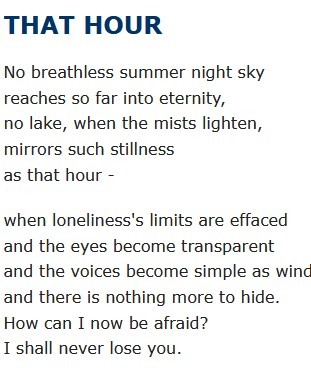
68 notes
·
View notes
Text
NEVER UNDERESTIMATE THE POWER OF A GOOD BOOK CLUB!!
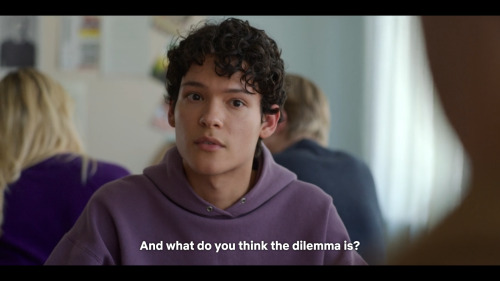
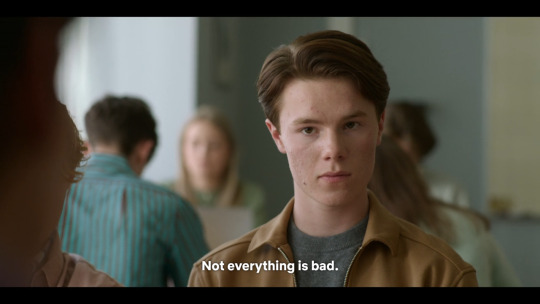
#Karin Boye saved the gays a hundred years later#what a queen#rip 20th century lesbians you really paved the way🫡#young royals#wilmon
59 notes
·
View notes
Text
Drabble Challenge BONUS: Book (Karin)
The surprise epilogue of Makes the Medicine Go Down, a story originally told over seven drabbles from seven different POVs. You can read the sequence from the beginning over at AO3.
Because you all connected with Karin so much, I’ve added a bonus drabble from her point of view. I hope you all enjoy reading it as much as I enjoyed writing it!
And also: stay tuned for two additional standalone drabbles that I got as requests, in future posts.
This drabble challenge was organized by our pals at @youngroyals-events, and I’ve had so much fun writing.
Book (Karin)
Karin wonders if she’s trying too hard, coming to her first book club with the novel tagged and annotated.
Still, her pretty post-its soothe her as the text alert beeps on her phone.
From Vincent:
She’s excited to see you this weekend. FYI she scraped her knee skateboarding, but I got her bandaged. Enjoy yourself tonight!
Juni, hugging her board and sporting neon bandages, beams at Karin from an attached photo.
“Everything okay?” asks Wilhelm, her new book club friend.
“Yeah. My ex handled it.” Karin’s glad she can finally say that. “So, what did you think of the characters?”
#young royals#yrdc2024#vincent af klintskog#who has finally figured it out#wilhelm boye#(that’s my chosen surname for unprince wilhelm)#idk how to tag karin and juni
14 notes
·
View notes
Text
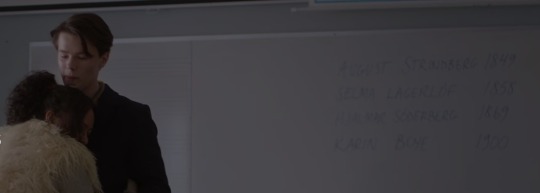
Hi, I'm new to Tumblr, new to the YR's fandom. Been lurking for a while. This is my first post. I obsess so much about this show. Not so healthy to be in such limerence, not getting so much work done lately. I took the obsession to a whole new level by subscribing to TV microscope's substack, getting a twitter account, an insta account etc. And it has just been feeding the obsession so far.
Anything to get some content.
Thanks for all these lovely insights. I've been reading an insane amount of stuff. I just refrained from reading the fanfic for lack of mental space.
Has someone a link to an analysis about the literary books that serve as intertextual reference in the show ? Apart form the Karin Boye reference, there is also a moment when Wille and Felice enter a classroom to clear the air after the awkward kiss. And there on the board, in capital letters, you have the list of the books they had to choose from (August Strindberg, 1849, Selma Lagerlof 1858, Hjalmar Soderberg 1869 and Karin Boye 1900. ) Can anyone link them to the show ?
Thanks in advance. I am not that versed in scandinavian authors (I had only heard about Stringberg).
#young royals#edvin ryding#omar rudberg#sweden#karin boye#wilmon#prince wilhelm#boris is the best 💜#wille
46 notes
·
View notes
Text


Eternity by Karin Boye: S3E6
15 notes
·
View notes
Text
"evighet"
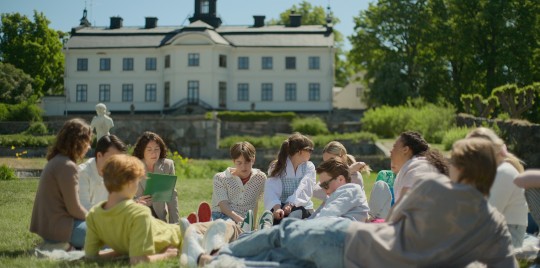
"En gång var vår sommar en evighet lång. Vi strövade i soldagar utan slut en gång. Vi sjönk i gröna doftande djup utan grund och kände ingen ängslan för kvällningens stund.
Vart gick sen vår evighet? Hur glömde vi bort dess heliga hemlighet? Vår dag blev för kort. Vi strävar i kramp, vi formar i strid ett verk, som skall bli evigt - och dess väsen är tid.
Men än faller tidlösa stänk i vår famn en stund då vi är borta från mål och namn, då solen faller tyst över ensliga strån och all vår strävan syns oss som en lek och ett lån.
Då anar vi det villkor vi en gång fick: att brinna i det levandes ögonblick, och glömmer det timliga, som varar och består för den skapande sekunden, som mått aldrig når."
~ Karin Boye
#yr s3#imagine the love of your life dumps you#and the next day you have to listen to this poem#fucking ouch#poor wille lol#young royals#also thanks to#neverscreens#for the screencap#<3#Karin Boye
12 notes
·
View notes
Text
imagine young royals ends with wille killing himself bro
#like the karin boye book scene in s2#I'd actually start sobbing bro#young royals#young royals s3#wilhelm young royals#simon young royals#wilmon
15 notes
·
View notes
Text
A new Karin Boye poem for Wille’s wall post s3:
Jag vill möta... // I want to face… (1927) ⚔️🕊️
Rustad, rak och pansarsluten
Equipped, in line and armored
gick jag fram --
I went on --
men av skräck var brynjan gjuten
But out of horror was the armor cast
och av skam.
and of shame.
Jag vill kasta mina vapen,
I want to throw aside my weapons,
svärd och sköld.
sword and shield.
All den hårda fiendskapen
All the fierce hostility
var min köld.
was my cold.
Jag har sett de torra fröna
I have seen the dry seeds
gro till slut.
sprout at last.
Jag har sett det ljusa gröna
I have seen the bright green
vecklas ut.
unfold.
Mäktigt är det späda livet
Mighty is my delicate life
mer än järn,
more so than iron,
fram ur jordens hjärta drivet
driven from the heart of the earth
utan värn.
without guard.
Våren gryr i vinterns trakter,
Spring dawns in winter’s realm,
där jag frös.
where I froze.
Jag vill möta livets makter
I want to face the forces of life
vapenlös.
unarmed.
13 notes
·
View notes
Text
Yes, of course it hurts when buds burst
– Wilhelm in the light of Karin Boye
In the second season, Wille and Simon work together on a group project about the book Kris "Crisis" by Karin Boye. The book's plot has obvious parallels to Simon and Wille's story, allowing them to reflect on their own relationship through their discussion of the book. I wonder whether including a work by Karin Boye may serve another purpose in the series as well.
In Norway where I'm from, and I think in Sweden as well, Karin Boye's name is inextricably linked to her most well-known poem Ja visst gör det ont när knoppar brister "Yes, of course it hurts when buds burst". The title/first line of this poem is particularly famous and is frequently referenced. In fact, whenever I hear or think of Karin Boye, this line automatically pops into my head, and I don't think I'm alone in that. As it happens, this poem may also serve as a beautiful metaphor for Wille's journey in the series.
Here is the full poem, first in the original Swedish version, then in an English translation slightly adapted from Jenny Nunn's translation:
Ja visst gör det ont när knoppar brister.
Varför skulle annars våren tveka?
Varför skulle all vår heta längtan
bindas i det frusna bitterbleka?
Höljet var ju knoppen hela vintern.
Vad är det för nytt, som tär och spränger?
Ja visst gör det ont när knoppar brister,
ont för det som växer
och det som stänger.
Ja nog är det svårt när droppar faller.
Skälvande av ängslan tungt de hänger,
klamrar sig vid kvisten, sväller, glider –
tyngden drar dem neråt, hur de klänger.
Svårt att vara oviss, rädd och delad,
svårt att känna djupet dra och kalla,
ändå sitta kvar och bara darra -
svårt att vilja stanna
och vilja falla.
Då, när det är värst och inget hjälper,
brister som i jubel trädets knoppar.
Då, när ingen rädsla längre håller,
faller i ett glitter kvistens droppar .
glömmer att de skrämdes av det nya,
glömmer att de ängslades för färden –
känner en sekund sin största trygghet,
vilar i den tillit som skapar världen.
Yes, of course it hurts when buds burst.
Otherwise why would spring hesitate?
Why would all our fervent longing
be bound in the frozen bitter haze?
The bud was the casing all winter.
What is this new thing, which consumes and bursts?
Yes, of course it hurts when buds burst,
pain for that which grows
and for that which envelops.
Yes, it is surely hard when drops fall.
Trembling with fear they hang heavy,
clammer on the branch, swell and slide -
the weight pulls them down, how they cling.
Hard to be uncertain, afraid and divided,
hard to feel the deep pulling and calling,
yet sit there and just quiver –
hard to want to stay
and to want to fall.
Then, at the point of agony when all is beyond help,
the tree's buds burst as if in jubilation,
then, when no fear holds them back any longer,
the branch's drops tumble in a shimmer,
forgetting that they were afraid of the new,
forgetting that they were fearful of the journey –
feeling for a second their greatest security,
resting in the trust
that creates the world.
In the series, we see how Wille goes from letting his family dictate his life, to realising what agency he does have, and finding his own voice and path. We see him going from trying to conform to what is expected of someone in his role, to prioritising himself and Simon and their love. We see him going from struggling with whether he as a crown prince can be openly queer, to coming out very publicly.
Karin Boye's poem reminds us of why Wille couldn't free himself from the expectations of him as crown prince and come out earlier: because the growth he goes through hurts so damn much. Even spring hesitates. How can we fault Wille for doing the same?
However, Boye's poem also provides us with hope. They start the group project on her book in episode three of season two, a very painful episode where Wille sinks into the depths of hopelessness and despair. It is as though the reference to Boye's poem which for me at least is implied here, tries to reassure us and Wille that everything will be alright. No matter how long spring hesitates, it will always arrive at last. The painful events of this episode is a catalyst for Wille and Simon's journey back to each other again, for Wille finding his voice and forging his own path. And we know that when no fear holds them back any longer, the drops will fall and spring will arrive at last. This moment comes during Wille's speech at the very end of the season, where he says: Jag är också rädd. Men jag tänker sluta med det nu. "I'm also scared. But that ends now." Immediately afterwards, he owns up to being in the video with Simon, thereby publicly coming out as queer and freeing himself from what has been expected of him as crown prince. The he turns and smiles at Simon, who smiles back. The buds have burst as in jubilation.
Whether the writers intend to evoke this poem or not, it perfectly encapsulates the enormous growth Wille goes through during these first two seasons. The growing process is incredibly painful, but it is what ultimately allows Wille to blossom and turn into a truer, better version of himself, letting everyone see the colours he has previously kept hidden inside himself. I can't wait to see Wille blossom in season three!
#crown prince wilhelm#prince wilhelm analysis#simon eriksson#wilmon#growing pains and blossoming#coming out#forging your own path#young royals#young royals analysis#karin boye#ja visst gör det ondt#scandinavian literature canon#thoughts overflowing my fixated mind
40 notes
·
View notes
Text

aww I love this
x
42 notes
·
View notes
Text
Hi tumblr, does anyone have the pdf of the English translation of Crisis by Karin Boye? I've been searching for a good while but can't find it 😕
#living in the middle east so my cc isn't usable for international purchases#and there is NO way that book is found in my homophobic country#Wilmon#young royals#crisis#karin boye
0 notes
Text
confession
a poem by Karin Boye

Never meant to be a rebel, and yet it was forced on me.

Why is my fate not private? Why can I not let it be?

Or, if now I must fight, why is there torment there?

Why not with sounding music, when at last I am forced to dare?

Blood of my blood, that judged me harshly and cast me out into shame,

I knew when I was ejected, that I broke on a whole all the same,

felt a sacred communion behind the condemning words,

knew with anguish: you are I - and was bowed down to the earth.

But as I lay and believed myself mute, I heard the darkness whine.

Souls from the same torments' room were breathing by my side.

I heard my own cry for help rise up from deserts void,

knew with dread: I am you - and could not be quiet.

Cowardly,

cowardly,

thrice cowardly,

All the same, I must fight,

be struck to the ground and rise again

with all my nerves snapped.

must feel like branding irons the judgements of the stark -

and obey and obey a scorching fire

that blossoms out of the dark.
from "För trädets skull"
(English translation by David McDuff)
#i've been thinking about this poem for weeks#so beautiful#karin boye#young royals#prince wilhelm#or...#ex-prince wilhelm
15 notes
·
View notes